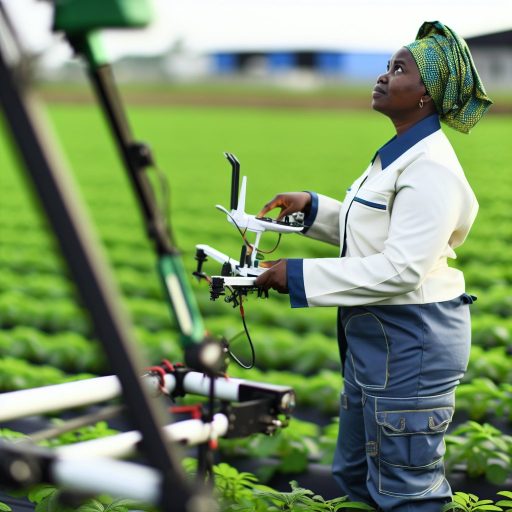Introduction to Agrochemistry and Its Significance in Agriculture
Agrochemistry plays a vital role in enhancing agricultural productivity.
This field focuses on the chemical processes that affect agricultural systems.
Agrochemists study substances that improve crop growth and protect plants.
These include fertilizers, pesticides, and herbicides.
Each of these chemicals serves a specific purpose in farming.
Fertilizers enrich the soil with essential nutrients.
They help plants grow stronger and produce higher yields.
Pesticides protect crops from pests and diseases.
Herbicides control unwanted weeds that compete with crops.
Overall, agrochemistry ensures food security in Nigeria.
Food security is critical for supporting the growing population.
Moreover, agrochemists act as consultants to farmers.
They provide guidance on pesticide and fertilizer application.
Agrochemists also contribute to sustainable farming practices.
They focus on reducing chemicals that harm the environment.
Additionally, they promote integrated pest management strategies.
Such strategies combine biological and cultural practices with chemicals.
Therefore, agrochemists create a balance between productivity and safety.
Agrochemical innovations drive Nigeria’s agricultural sector.
They enable farmers to produce more food sustainably.
Historical Overview of Agriculture in Nigeria and the Role of Agrochemists
Roots of Nigerian Agriculture
Agriculture has been a cornerstone of Nigerian society for centuries.
The ancient civilizations practiced farming techniques that thrived in the local climate.
Crop cultivation included staples such as yams, cassava, and grains.
Additionally, livestock farming gained prominence in various regions.
Over time, agriculture evolved with the introduction of new crops and methods.
The Emergence of Agrochemistry
The role of agrochemists became significant during the 20th century.
These professionals focused on enhancing crop production through scientific methods.
Nigeria began to see the importance of fertilizers and pesticides in agriculture.
Agrochemists conducted research to develop products suited for local conditions.
Furthermore, they worked on improving soil health and pest management strategies.
Advancements in Agricultural Practices
The introduction of agrochemicals transformed agricultural practices in Nigeria.
Farmers started to adopt modern techniques to increase yield.
As a result, the country sought greater food security and economic stability.
Agrochemists provided essential training to farmers on proper product usage.
This training emphasized the need for safety and environmental consideration.
Current State of Agrochemistry in Nigeria
Today, agrochemists play a vital role in sustainable agriculture in Nigeria.
They collaborate with farmers and government agencies to improve practices.
Additionally, they innovate solutions to combat climate change challenges.
Their expertise aids in developing integrated pest management approaches.
Moreover, they promote the use of organic and bio-based fertilizers.
Challenges Faced by Agrochemists
Despite advancements, agrochemists face significant challenges in Nigeria.
Access to quality agrochemicals remains a persistent issue.
Furthermore, there is often a lack of awareness among farmers about proper usage.
Challenges related to funding for research and development also exist.
Finally, maintaining environmental sustainability is crucial in their efforts.
Types of Agrochemicals Used in Nigerian Agriculture
Fertilizers
Fertilizers are crucial for enhancing soil fertility in Nigeria.
They provide essential nutrients for crop growth.
Farmers often use both organic and inorganic fertilizers.
Organic options include compost and manure.
Inorganic fertilizers contain synthesized nutrients for quick absorption.
Examples include urea and NPK (Nitrogen-Phosphorus-Potassium) fertilizers.
These fertilizers improve crop yields significantly.
Moreover, they help maintain soil health over time.
Farmers should apply fertilizers based on soil tests.
Doing so ensures they meet specific nutrient needs.
Pesticides
Pesticides play a vital role in pest management in Nigeria.
These chemicals target various agricultural pests effectively.
Common types of pesticides include insecticides, fungicides, and rodenticides.
Insecticides combat harmful insects that damage crops.
Fungicides prevent fungal diseases that threaten harvests.
Furthermore, rodenticides control rodent populations in fields.
Farmers often rely on integrated pest management strategies.
This approach combines chemical and non-chemical methods.
Consequently, it reduces pesticide resistance risks.
Effective pest control ensures higher quality produce.
Herbicides
Herbicides are essential for controlling unwanted weeds in crops.
Weeds compete with crops for nutrients and water.
The use of herbicides minimizes this competition.
Farmers can choose from pre-emergent and post-emergent herbicides.
Pre-emergent options prevent weed seeds from germinating.
On the other hand, post-emergent herbicides kill existing weeds.
Common herbicides in Nigeria include glyphosate and atrazine.
These chemicals enhance crop growth by clearing weed infestations.
Farmers should apply herbicides cautiously to minimize environmental impact.
Responsible usage maximizes agricultural productivity sustainably.
Delve into the Subject: How Agronomists Are Driving Agricultural Growth in Nigeria
The Role of Agrochemists in Improving Crop Yields and Securing Food Supply
Enhancing Soil Fertility
Agrochemists play a crucial role in enhancing soil fertility.
They develop fertilizers that optimize nutrient availability.
This ensures that crops receive essential minerals for growth.
Additionally, they test soil samples for nutrient deficiencies.
These tests inform specific recommendations for farmers.
Developing Crop Protection Strategies
Agrochemists create innovative pest control solutions.
These solutions minimize crop damage from insects and diseases.
Integrated pest management techniques are often employed.
These techniques reduce reliance on chemical pesticides.
Consequently, they promote a healthier agroecosystem.
Introducing Sustainable Practices
Agrochemists advocate for sustainable agricultural practices.
Publish Your Professional Profile, Business or Brand
Showcase your expertise, gain trust, and boost visibility instantly on Professions.ng.
Publish NowThis includes promoting organic farming methods.
They research eco-friendly alternatives to synthetic fertilizers.
Furthermore, they educate farmers on responsible chemical use.
Such practices ensure long-term soil health and productivity.
Improving Research and Development
Agrochemists spearhead research initiatives in Nigeria.
They study local crop varieties and their specific needs.
This research leads to tailored agrochemical solutions.
Moreover, it supports the development of drought-resistant crops.
These efforts significantly enhance food security in the region.
Collaboration with Agricultural Stakeholders
Collaboration is key in the work of agrochemists.
They work closely with farmers, extension workers, and policymakers.
This collaboration ensures the effective application of research findings.
It also facilitates the sharing of knowledge and resources.
Ultimately, such partnerships strengthen the agricultural sector.
Monitoring Environmental Impact
Agrochemists monitor the environmental impact of farming practices.
They assess the effects of agrochemicals on local ecosystems.
In addition, they provide guidelines for safe product use.
This minimizes the risk of environmental degradation.
Their work is vital in promoting sustainable agriculture.
Explore Further: The Future of Agribusiness in Nigeria: Careers in Agro-processing
Impact of Agrochemicals on Soil Health and Fertility Management
Enhancing Nutrient Availability
Agrochemicals significantly enhance nutrient availability in the soil.
They provide essential elements such as nitrogen, phosphorus, and potassium.
These nutrients support plant growth and improve crop yields.
Additionally, agrochemicals can help balance soil pH levels.
This balance encourages beneficial microbial activity in the soil.
Soil Fertility Management Techniques
Several techniques help manage soil fertility effectively.
Crop rotation is a popular method used by farmers.
This technique prevents nutrient depletion and promotes soil health.
Furthermore, integrated use of agrochemicals can optimize fertility.
Farmers can use soil testing to determine specific nutrient needs.
Impact on Soil Microbial Communities
Agrochemicals influence soil microbial communities significantly.
They can enhance the population of beneficial microbes.
These microbes play a crucial role in soil nutrient cycling.
However, excessive use of agrochemicals may lead to negative effects.
It is important to apply these chemicals judiciously.
Sustainable Practices for Soil Health
Implementing sustainable practices can improve overall soil health.
Utilizing organic fertilizers enhances soil organic matter levels.
This practice supports soil structure and reduces erosion.
Additionally, cover cropping helps maintain soil moisture and fertility.
Such sustainable approaches reduce dependency on synthetic agrochemicals.
You Might Also Like: Top Agricultural Science Careers Transforming Nigeria’s Farming Sector
Sustainable Agricultural Practices and the Contribution of Agrochemists
Role of Agrochemists in Agriculture
Agrochemists play a crucial role in enhancing agricultural productivity.
They focus on improving soil health through various interventions.
This includes the development and application of fertilizers that optimize growth.
Moreover, agrochemists work on herbicides and pesticides to manage pests effectively.
The safe usage of these chemicals minimizes crop losses.
Innovations in Agrochemical Development
Innovation drives the agrochemical sector forward.
Agrochemists are constantly researching to develop new products.
This research includes creating environmentally friendly and sustainable options.
Such products lessen the overall environmental impact of farming.
Notably, biopesticides represent a growing area of focus.
Education and Knowledge Dissemination
Education is vital in promoting sustainable practices.
Agrochemists educate farmers on the proper use of chemicals.
They conduct workshops and training sessions regularly.
Furthermore, knowledge transfer enables farmers to make informed decisions.
This approach enhances overall farm management and productivity.
Collaboration with Farmers
Effective collaboration is key to successful farming practices.
Agrochemists work closely with farmers to understand their challenges.
This relationship fosters trust and encourages the adoption of new techniques.
Through this collaboration, agrochemists can tailor solutions to specific needs.
Ultimately, these partnerships lead to increased yields and sustainable results.
Find Out More: Step-by-Step Guide to Pursuing a Career as an Agronomist in Nigeria

Challenges Faced by Agrochemists in Nigeria
Regulatory Framework
The regulatory framework for agrochemicals in Nigeria presents significant challenges.
The complexity of these regulations often hinders access to essential products.
Agrochemists must navigate both local and international compliance standards.
Understanding these regulations is critical for successful product development.
Moreover, frequent changes in regulations create uncertainty in the market.
This often leads to delays in product registration and approval processes.
Market Access
Market access issues hamper the growth of agrochemical products in Nigeria.
Many agrochemical companies face barriers in reaching farmers effectively.
Limited distribution networks impede product availability in rural areas.
Additionally, high competition from local and international brands complicates market entry.
This can discourage innovation within the sector.
Education and Training
Insufficient education and training remain serious challenges for agrochemists.
Many professionals lack access to the latest research and development opportunities.
Consequently, they may not fully understand the benefits of new technologies.
This knowledge gap can affect effective product use in agricultural practices.
Furthermore, inadequate training programs diminish the potential for safe chemical application.
Economic Factors
The economic environment impacts the effectiveness of agrochemists’ work.
Farmers often struggle with financial constraints when purchasing agrochemicals.
This leads to reduced investment in essential crop protection solutions.
Additionally, fluctuating exchange rates pose challenges for imported products.
These economic factors limit the potential impact of agrochemistry on agricultural productivity.
Environmental Concerns
Environmental concerns introduce additional challenges for agrochemists in Nigeria.
Public perception of agrochemicals can influence market acceptance.
Agrochemists must address these concerns through sustainable practices.
They are tasked with finding eco-friendly solutions to meet agricultural needs.
Publish Your Professional Profile, Business or Brand
Showcase your expertise, gain trust, and boost visibility instantly on Professions.ng.
Publish NowMoreover, balancing productivity with environmental sustainability remains a crucial issue.
Case Studies of Successful Agrochemical Interventions in Nigerian Farming
Increase in Maize Yield in Kaduna State
In Kaduna State, agrochemists introduced a new fertilizer blend designed for local soil conditions.
This fertilizer significantly improved maize yield over three growing seasons.
Farmers reported an increase of up to 30% in their harvests.
Training workshops helped farmers understand optimal application techniques.
As a result, many families experienced improved food security and income.
Pest Control Success in Ogun State
A group of agrochemists developed an integrated pest management program in Ogun State.
This program reduced pest damage in soybean crops by using targeted pesticides.
Farmers learned how to identify pests early and choose effective treatments.
This proactive approach led to healthier crops and better yields.
Consequently, local soybean production increased, benefiting the community economically.
Rice Production Enhancement in Ebonyi State
In Ebonyi State, a new hybrid rice variety was introduced by agrochemical experts.
This variety was resistant to common diseases that plagued local farms.
Alongside this, optimized fertilizer schedules were promoted.
Farmers who adopted these changes reported doubling their rice yields.
This transformation helped stabilize rice prices in the local market as well.
Collaborative Efforts with Local Farmers
Collaborations between agrochemists and local farmers proved effective across several regions.
Regular field days educated farmers on new agrochemical technologies.
Feedback from farmers helped tailor products to address specific challenges.
Such partnerships fostered trust and yielded better farming results.
Overall, cooperation ensured sustainable agricultural practices in communities.
Impact on Community Livelihoods
The success of agrochemical interventions has positively impacted livelihoods.
Farmers gained access to better yields, leading to increased income.
This financial stability allowed families to invest in education and health.
Moreover, local markets expanded with a more robust supply of agricultural products.
As such, communities experienced holistic improvements in living standards.
Future Prospects and Innovations in Agrochemistry for Nigerian Agriculture
Advancements in Biopesticides
Biopesticides offer eco-friendly solutions for pest control.
Research is underway to optimize their use in Nigerian farms.
Farmers can reduce chemical pesticide reliance through these innovations.
Additionally, biopesticides can enhance soil health and biodiversity.
Precision Agriculture Technologies
Precision agriculture is revolutionizing farming practices in Nigeria.
Farmers can use data-driven insights to enhance crop yields.
Tools like drones and IoT devices provide real-time data.
This information helps in making informed agrochemical applications.
Integrated Pest Management Practices
Integrated Pest Management (IPM) combines various methods for pest control.
Agrochemists are developing IPM strategies tailored to local conditions.
These practices minimize environmental impact and promote sustainability.
Furthermore, they help maintain pest populations at manageable levels.
Enhanced Fertilizer Formulations
Innovative fertilizer formulations can significantly enhance crop growth.
Agrochemists are focusing on slow-release fertilizers for sustained nutrition.
Such fertilizers can improve nutrient uptake efficiency in plants.
Moreover, they contribute to reducing nutrient runoff into water bodies.
Collaboration with Local Farmers
Collaboration between agrochemists and local farmers is essential.
Agrochemists work closely with farmers to understand their challenges.
This partnership fosters the development of targeted solutions.
Ultimately, it leads to sustainable agricultural practices across Nigeria.




